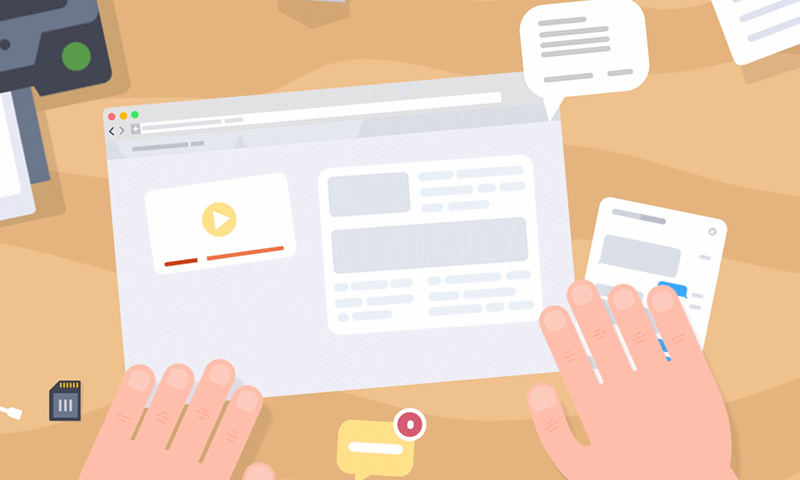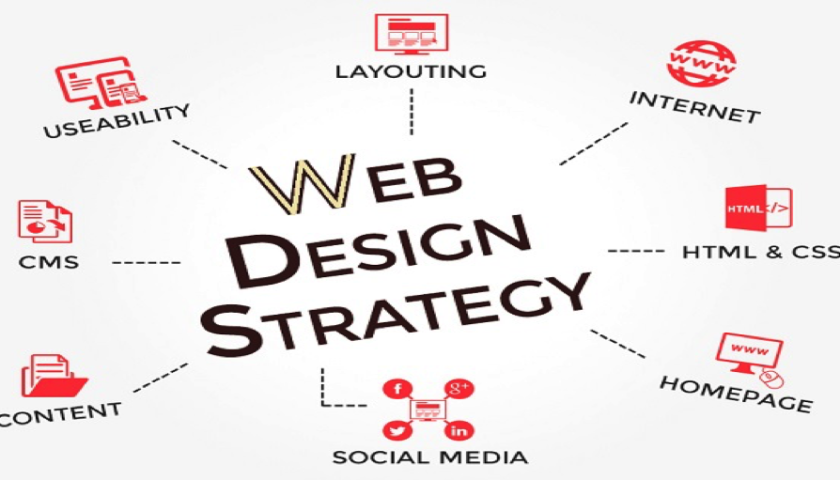In today’s digital age, having a website isn’t a luxury—it’s a necessity. Whether you’re a small startup or an established business, your online presence plays a vital role in your overall success. A well-designed website does more than just showcase your products or services; It can be a powerful tool for generating revenue, strengthening your brand and connecting with your audience in a meaningful way.

Let’s explore how a website can be a game changer for your business.
1. Increase your income:
One of the reasons to invest in a website is its potential to increase your bottom line. Unlike a physical storefront, a website is open 24/7, allowing customers to interact with your business at any time. This constant access means you can capture sales and referrals even when your office is closed. Additionally, a well-designed website can attract new customers through search engines, expanding your market beyond your local area. Whether it’s through direct online sales, lead generation, or increasing foot traffic to your physical location, your website is a powerful revenue generating asset.
2. Increase your ROI :
Every business decision revolves around return on investment (ROI), and your website is no exception. When done right, a website can generate one of the highest ROIs of any marketing strategy. Unlike traditional advertising channels, which can be expensive and complex, the web can consume and analyze every aspect of user interaction With tools like Google Analytics you can see which pages turn, where visitors land, and how they got to your site in the first place . This data empowers you to make informed, well-prepared decisions .
3. Strengthen your branding and marketing strategy:
Your website is the cornerstone of your branding and marketing strategy. This is where customers first experience your brand, and it’s often where they decide if they should engage further. A well-designed website reflects your brand’s values, tone, and visual identity, and ensures a consistent experience across all touchpoints. By integrating your website with your social media platforms, email campaigns and content marketing efforts, you create a cohesive and cohesive brand presence that resonates with your audience This not only creates brand loyalty but positions you as a leader in your business as well.

4. Provide social proof :
In an age where consumers have access to more information than ever before, social proof is increasingly important. Your website is a great place to showcase testimonials, case studies, and customer reviews that build trust and confidence. By highlighting positive experiences from real customers, you can address potential concerns and entice new visitors to choose your business over competitors. A section dedicated to adding or formally displaying testimonials throughout your site can greatly influence purchasing decisions and create a sense of community around your brand encounter.
5. Benefits of customer testimonials :
Customer testimonials aren’t just pretty things on your website; They are powerful tools that can influence potential customers. When visitors see positive reviews from others who have used your product or service, it adds an element of authenticity and credibility. Testimonials can be particularly effective where a purchasing decision involves a significant investment or risk. By displaying detailed and authentic testimonials, you demonstrate clarity and credibility in your offerings, which can be key for hesitant customers
6. Stick to your story :
In today’s fast-paced digital world, it’s important to control the story of your business. You are only allowed on your website. Unlike social media platforms or third-party review sites where you don’t have much control, your website is your domain—literally. Here, you can develop the pitch, highlight unique selling points, and address any misconceptions directly. This authority extends to your blog, where you can share insights, respond to industry trends, and position yourself as an expert in your field. By owning your story, you shape how your brand is perceived and build lasting relationships with your audience.
7. Facilitate constructive conversation:
Your website isn’t just a static page; It is a dynamic platform that can facilitate meaningful conversations with your audience. Through contact forms, live chat, and interactive elements such as forums or comment sections, you can interact with customers, answer their questions, and gather valuable feedback. These communications not only increase customer satisfaction but also give you insight into the needs and wants of your audience.
In today’s digital age, having a website isn’t a luxury—it’s a necessity. Whether you’re a small startup or an established business, your online presence plays a vital role in your overall success. A well-designed website does more than just showcase your products or services; It can be a powerful tool for generating revenue, strengthening your brand and connecting with your audience in a meaningful way.
Facts, figures and statistics about web design
1. First impressions & design importance:
94% of leads are related to your website design. A poorly designed website can easily turn users away, leading to lost business opportunities (source: Intermediate). 75% of consumers admit to judging a company’s trustworthiness based solely on website design (source: Stanford University).
2. Mobile responsiveness:
57% of users say they wouldn’t recommend a business with a poorly designed mobile site (source: CMS Report). About 50% of global web traffic comes from mobile devices, making responsive design essential to engaging and retaining visitors (source: Statista).
3. During page load
Websites that open in 2 seconds have an average 9% bounce rate, while websites that take 5 seconds or more have 38% bounce rates (source: Pingdom). Delaying page load time by 1 second can reduce conversion rates by 7% (source: Neil Patel).
4. SEO & Design :
Websites that are optimized for SEO have 53% more organic traffic than those that aren’t (source: BrightEdge). 88% of online users rarely return to a website after a bad experience, which often includes slow load times and poor design (source: Econsultancy).

5. Number of changes:
38% of people will stop engaging with a website if the content or layout is not appealing (source: Adobe). Improving the design and user experience of your site can increase conversions by 200-400% (source: Forrester Research).
6. Video collaboration:
Having a video on your landing page can increase conversions by 86% (source: EyeView Digital). 73% of visitors who watch a product’s video are more likely to buy later (source: HubSpot).
7. Reliability and Security:
85% of consumers won’t continue to interact with a site if it’s not secure, meaning that HTTPS is now a basic expectation (source: GlobalSign). 42% of users will leave a website due to poor functionality, such as broken links or pages (source: GoodFirms).
8. E-Commerce Account : 48% passed that website design is the number one determinant of a business’s credibility (source: Blue Corona). If it takes more than 3 seconds to load, 40% of users will abandon the website (source: Kissmetrics). These statistics highlight the importance of effective, functional and user-centered website design in terms of business growth, trust building and increased customer engagement.
9. Content and Engagement
- 47% of website visitors check a company’s products/services page before looking at any other section (Source: Blue Corona).
- 93% of consumers say they are more likely to purchase from a brand that provides relevant, engaging content on their website (Source: Content Marketing Institute).
- 70% of small business websites lack a clear call to action (CTA) on their homepage, which significantly impacts conversion rates (Source: Small Business Trends).
These statistics underscore the importance of effective, responsive, and user-centered website design in driving business growth, building trust, and enhancing customer engagement.
1. User Experience (UX) : . 88% of online users rarely return to a website after a bad user experience (source: Econsultancy). A good user experience can increase conversion rates by up to 400% (source: Forrester). 70% of online businesses that fail do so because of poor implementation, not a lack of requirements for the product or service (source: UXCam).
2. Happy eyes : 46% of website visitors judge a company’s trustworthiness based on visual design alone (source: Stanford Persuasive Technology Lab). 38% of users will stop interacting with a site if the layout isn’t appealing or the content isn’t appealing (source: Adobe). Strategic use of color in web design can increase brand recognition by up to 80% and improve overall stakeholder engagement (source: Color Theme).

4. Availability of resources: 1 in 4 adults in the US. live with a disability, making web accessibility an important policy consideration (source: CDC). Accessible websites can help 1 billion people with disabilities worldwide get into jobs (source: World Health Organization). Companies with accessible websites outperform competitors, generate 2 times more revenue and have 4 times better shareholder returns (source: Forrester).
5. Content and input : 47% of website visitors look at a company’s products/services page before looking at another section (source: Blue Corona). 93% of consumers say they are more likely to buy a brand that provides relevant, engaging information about themselves
6. E-commerce Design
- 80% of customers are more likely to purchase from a business that offers a personalized experience on their website (Source: Epsilon).
- 69% of users abandon their online shopping cart due to usability issues or poor design (Source: Baymard Institute).
- 32% of small businesses with a website can generate revenue through e-commerce features integrated into their sites (Source: Clutch).
7. Website redesign:
39% of website redesign companies see improvements in website performance and user engagement immediately after launch (source: Top Design Firms). Redesigning the website to make it more user-friendly can increase page views by 60% and reduce bounce rates by 35% (source: Blue Fountain Media). 61% of marketers say improving SEO and increasing their organic presence are their inbound marketing priorities when redesigning their websites (source: HubSpot).
8. Blogging and content management :
Businesses with blogs drive 67% more traffic than those without (source: DemandMetric). Companies that update their blogs more frequently show a 126% higher lead (source: HubSpot). 72% of marketers say that creating relevant content was the most effective SEO strategy for driving traffic to their website (source: Ascend2).

9. Reliability and Security:
48% of consumers believe that website design is the number one factor in judging a business’s trustworthiness (source: Ironpaper). 95% of internet users say they won’t send their information to websites that appear insecure or outdated (source: Blue Corona). Websites with SSL certificates and “HTTPS” URL security have seen up to a 25% increase in traffic after conversion (source: GlobalSign).
10. User Retention
- 80% of customers who have a bad experience on a website are unlikely to return (Source: Oracle).
- 57% of customers say they will not recommend a business with a poorly designed mobile website, underscoring the importance of mobile responsiveness (Source: CMS Report).
These statistics highlight how impactful a good website design can be, affecting everything from user trust and engagement to business success and overall revenue.
Contact me for your web designing needs
FAQ’s for web designing
1. Why is it important for my business to have a website?
A website is important because it gives your business a 24/7 online presence. It allows potential customers to search, engage, get relevant information and buy whenever your brand. It also acts as a focal point for your branding, marketing and customer communication efforts.
2. How can a website increase my income?
A website increases revenue by attracting more customers, both locally and globally, through search engine optimization (SEO) and online marketing strategy This enables online sales, first generation , and allows you to capture business opportunities that you would otherwise miss if they weren’t online
3. What role does a website play in increasing ROI?
A well-designed website can dramatically improve ROI by generating leads, converting visitors into customers, and retaining existing customers through engaging features and experiences. By analyzing user behavior and website performance, you can continuously refine your marketing efforts to maximize your return on investment.
4. How does a website help in branding?
Your website acts as the digital face of your brand, helping you communicate your brand values, mission and personality to your audience. A professional and well-designed website ensures that your brand is consistently represented in all channels, and reinforces brand recognition and loyalty.
5. What is social proof, and why is it important for a website?
Social proof refers to positive comments, reviews and testimonials from customers that assure new visitors that your business is good and credible. Displaying social proof on your website builds trust and confidence, which can increase conversions and reduce hesitation from potential customers.
6. Why did I include customer testimonials on my website?
Customer testimonials provide real-life examples of satisfied customers and their experiences with your product or service. These testimonials help build trust with potential customers, making them more likely to choose your business over competitors. Testimonials act as endorsements and validate your business profile.
7. How can a website control my business story?
A website gives your business complete control over content and messaging. You can use your website to tell your story, showcase your accomplishments, clarify your values, and address customer concerns directly. This authority helps shape how your business is perceived in the marketplace.
8. Can a website help me have constructive conversations with customers?
Yes, the website facilitates communication with your customers through contact forms, live chat, blog and comment sections. These tools allow for direct feedback, questions, and conversations, allowing customers to better understand their needs, solve problems, and build relationships.
9. What happens if I don’t have a business website?
Without a website, your business misses out on countless opportunities, such as reaching new customers, building brand awareness and increasing trust. In today’s digital world, not having a website can make your business seem outdated or out of place for potential customers.
Click here to access the most trending business opportunity
10. If I am active on social media, do I need a website?
Yes, although social media is valuable for building relationships and driving traffic, it cannot replace the website. A website serves as the foundation of your online presence and provides a platform for e-commerce, detailed information, and complete control over your business narrative, which social media platforms do not offer.
11. What are the keys to building a good website?
The keys to a good website are: Practical design: The website should adapt to different screen sizes and devices. Intuitive Navigation: Menus and links should be accessible and easy to use. Consistent branding: The design should reflect the colors, fonts and style of your brand. Fast load times: Pages should load fast to avoid as user frustration. High quality content: Text, images, and video should be clear, relevant, and engaging. Clear Calls to Action (CTAs): Buttons and links should direct users to desired actions, such as signing up or making a purchase.
12. What is responsive design, and why do I need it?
Responsive design is a design approach where a website adapts automatically to different devices such as desktops, tablets, and smartphones. It’s important because more than half of web traffic comes from mobile devices. Without a functional layout, your site will look broken or difficult to use on mobile, resulting in high bounce rates.
13. How does website design affect SEO?
Website design impacts SEO in many different ways. A well-designed website improves user experience (UX), and can reduce bounce rates and increase time spent on a site, two factors that positively affect search engine rankings.
14. How often should I update or redesign my website?
A website should be updated or redesigned every 2-3 years to stay current, technologically advanced, and changing customer expectations. Content, plugins, and security features need to be updated frequently to ensure that the site functions smoothly and securely.
15.What is the difference between UI (User Interface) and UX (User Experience) in web design?
UI (User Interface) focuses on the visual elements of a website, such as buttons, layout, colors and text. It’s about the look and feel of the site. UX (User Experience) deals with the overall experience of users on a website. This includes ease of use, efficiency, and how well the website meets the user’s needs. A great UI can boost UX, but both must work in harmony for an effective website.
16. What are the most common mistakes in web design?
Common website development mistakes include: Cluttered layout: Too much information on a page can overwhelm users. Slow loading time: If the page takes too long to load, visitors may leave. Poor mobile optimization: If the site is not mobile-friendly, it will lose visitors. Complex navigation: Menus or links that are difficult to access can frustrate users. Lack of a clear CTA: Without a clear call to action, users don’t know what to do next, resulting in missed conversions.
17. Do I need a custom website, or can I use templates?
It depends on your business needs and budget. Templates are a cost-effective option for small businesses or startups and can be customized to some extent. However, custom websites are ideal for businesses that require unique features, branding, and functionality that can’t be achieved with templates. Custom design allows for greater flexibility and control over the user experience.
18. How much does a website design typically cost?
The cost of a Web site can vary greatly, depending on the complexity of the Web site and the knowledge of the developer. A basic website can cost from $2,000 to $10,000, while a more complex e-commerce or custom website can range from $10,000 to $50,000+ and maintenance, hosting, and ongoing updates will increase the overall cost.
19. What is the role of a content management system (CMS) in website design?
A Content Management System (CMS) allows you to manage and update your website content without needing to know how to code. Popular CMS platforms like WordPress, Joomla, and Drupal provide easy-to-use dashboards where you can edit text, images, and other media. A CMS is essential for businesses that want to update their website regularly without relying on a web developer.
20. How important is security in website design?
Security is crucial in website design, especially for e-commerce sites or those that collect sensitive data. Ensuring your website uses SSL certificates, secure hosting, and regularly updated plugins helps protect against data breaches, hacks, and malware. Search engines like Google also favor secure sites, making security an important factor in SEO.
Conclusion
In the digital landscape, your website is your most valuable asset. It’s not just a way to make money; It’s a platform to build your brand, communicate with customers and execute your business story. By investing in a well-designed and user-friendly website, you are setting your business up for success in an increasingly competitive market. Don’t underestimate the power of your website—it’s the foundation upon which your online presence, and ultimately your business, is built.


